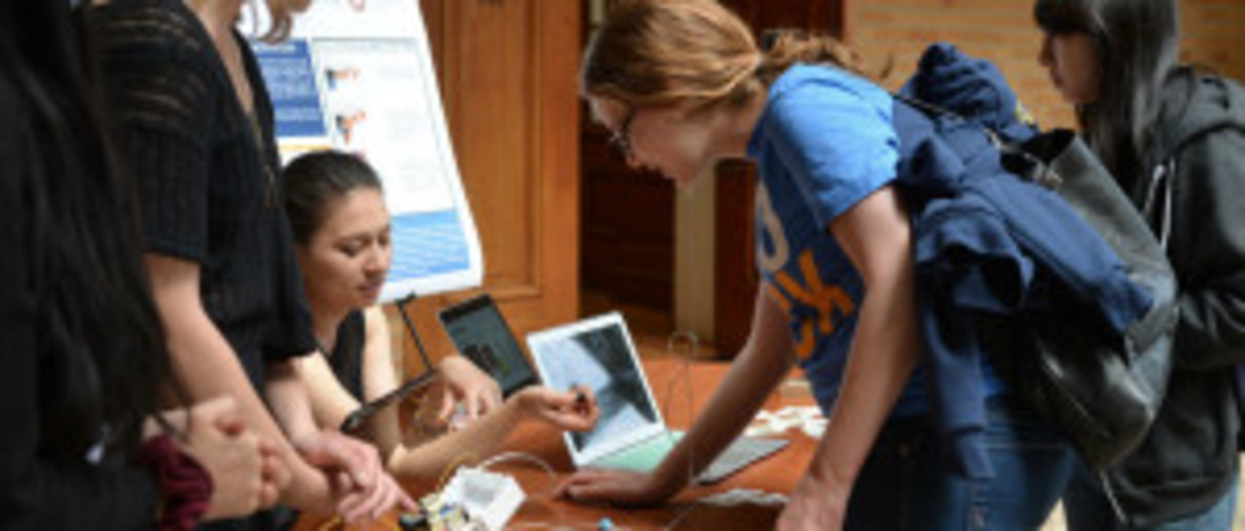BCNM's Recommended Spring 16 Courses Now Out!

Spring 2016 is fast approaching and there are some amazing courses on offer this coming semester! Check out the highlights of new media courses on offer this Spring 2016! And here are a few we're proud to be offering:
Graduate Courses
NWMEDIA 200, 4 units
History and Theory of New Media
(Also TDPS 266)
A. De Kosnik
This graduate seminar is one of the core requirements for the Designated Emphasis in New Media, offered by the Berkeley Center for New Media. This course will provide participants with a foundation in new media studies (major works, authors, historical events, objects, and schools of thought), such that they will be able to compile reading lists for their qualifying exams, bibliographies for their dissertations, and syllabi for their courses on topics related to new media. It will develop participants’ skills in analyzing new media texts and artifacts, articulating their insights in speech and writing, and developing individual new media research projects.
NWMEDIA 203, 4 units
Critical Making: Materials, Protocols,
and Culture
E. Paulos
Critical Making will operationalize and critique the practice of “making” through both foundational literature and hands on studio culture. As hybrid practitioners, students will develop fluency in readily collaging and incorporating a variety of physical materials and protocols into their practice. With design research as a lens, students will envision and create future computational experiences that critically explore social and culturally relevant technological themes such as community, privacy, environment, education, economics, energy, food, biology, democracy, activism, healthcare, social justice, etc. While no previous technical knowledge is required to take this course, class projects will involve basic programing, electronic circuitry, and digital fabrication design. While tutorials and instruction will be provided, students will be expected to develop basic skills in each of these areas in order to complete the course projects. The class will alternate between lectures (BCNM Commons) and hands on studio (CITRIS Invention Lab) time. The course will result in a final public show of student work. Due to the hands-on nature of this course, we have a strict capacity limit. Please join the waitlist and come to the first class meeting.
NWMEDIA C265, 2 units
(Also INFO C265)
Interface Aesthetics
Staff
This course will cover new interface metaphors beyond desktops (e.g., for mobile devices, computationally enhanced environments, tangible user interfaces) but will also cover visual design basics (e.g., color, layout, typography, iconography) so that we have systematic and critical understanding of aesthetically engaging interfaces. Students will get a hands-on learning experience on these topics through course projects, design critiques, and discussions, in addition to lectures and readings.
Undergraduate Courses
NWMEDIA 190-001, 3 units
Electronic Literature
A. Saum-Pascual
Trying to bridge the gap between artists and critics, this exciting course engages in the critical making of digital literature together with the writing of scholarly essays on related topics. “Electronic Literature: A Critical Writing & Making Course” is a hybrid class that combines humanities literary analysis with the teaching of digital tools and resources through practical, hands-on work.
Throughout the semester you will learn how to talk and write about E-Lit (e.g. hypertext narratives, kinetic poetry, automatic generators, social media fictions, chatterbots… and many, many more!), learning specific terminology and theoretical frameworks for its analysis. Further, you will also gain the skills to hack, remix, and build your own digital poems and stories in a collaborative workshop setting. Apart from working in the classroom and labs, final projects will be showcased in the electronic literature exhibit: No Legacy || Literatura Electrónica (Doe Library) from March to August 2016. Show the world what you can do!!
[No prior technical knowledge is necessary to take this class, but knowledge of Spanish is required. Non-Spanish majors/minors can opt to be evaluated in English, but instruction will be delivered in Spanish. Spanish majors and minors will complete their assignments in Spanish]
